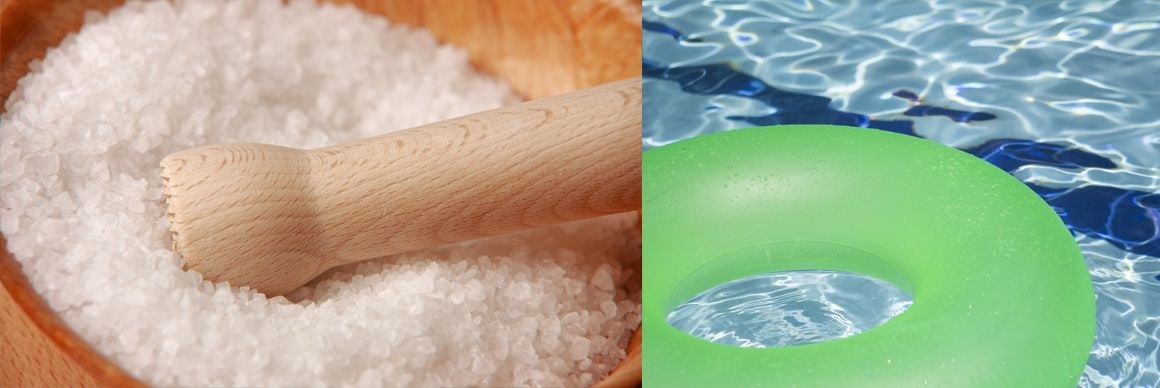The following is a guest post from Diane Pierce at Authentic Plaster & Tile.
Both saltwater pools and traditional chlorine types have awesome features. If you’re on the fence, you certainly aren’t alone. Which features suit you best? Read on!
Saltwater Pools
The biggest myth surrounding saltwater pools is that they contain zero chlorine.
But the truth may surprise you.
Saltwater pools ARE IN FACT A CHLORINE POOL. Saltwater pools use a process called “electrolysis” to produce chlorine FROM SALT to disinfect the water. A SALT CHLORINE GENERATOR IS USED TO PERFORM THIS TASK.
Pros
- Saltwater is pleasant to swim in and feels silky on skin.
- Chlorine output can be adjusted up or down to meet your needs. Planning to have several guests in the pool soon? You can easily increase the chlorine output to accommodate more swimmers, and reduce it again once the party is over.
- Salt is cheaper than chlorine. You'll likely find savings on chemicals throughout the season with a saltwater pool.
Cons
- A saltwater pool is more expensive than a traditional pool because it requires a higher initial investment in the sanitation system. The chlorine generator costs significantly more than a traditional erosion feed chlorinator.
- Salt chlorine generators don't last forever. You'll need to plan to replace them every 3-7 years.
- Saltwater pools are NOT HANDS OFF. Many perceive this to be the case because achieving crystal-clear water seems easy. Because of this, many stop testing the water's chemistry or test infrequently. Without regular and frequent testing you may not know the water is out of balance and potentially detrimental to the pool's surface or operating equipment.
Chlorine Pools
Chlorine pools are popular because it’s cheaper to install and easier to maintain. Unlike its saltwater counterpart, chlorine is added rather than produced.
Pros
- The initial investment is less. Much less.
- Chlorine pools use less electricity. Saltwater pools require a special salt chlorine generator to convert salt into chlorine. Chlorine pools, on the other hand, merely require a pump (to circulate the water in your pool, which prevents dirt, bacteria, and algae from multiplying in the water), and cleaning equipment.
- Traditional chlorine has been an industry staple for decades. Finding assistance for repairing or replacing parts will be very easy.
Cons
- Chlorine is a harsh chemical to work with and must be stored properly to avoid potential dangers.
- Chlorine products (liquid and solid) are more expensive than salt.
- Traditional chlorine systems are NOT MAINTENANCE FREE and require regular upkeep, including chemistry testing and chemical adjustments.
The Verdict
The “old-school” chlorine pool has been around for more than five decades, which makes the 30-ish year-old saltwater pools much younger.
Both require commitment and diligence. Many public establishments such as water parks and hotels have begun to convert to saltwater pools simply because they can require less manpower and are less expensive to keep clean. But a good number still stand by their chlorine pools because of the knowledge and experience of the team. Please keep in mind that saltwater systems must also be monitored and are not a “set-it-and-forget-it” system.
We at River Pools® hope this quick overview has been helpful.
We specialize in fiberglass pools, but we want our world-class pool education to help each person figure out which pool type and options are best for them.
There are pros and cons to all three pool types, including how they work with a saltwater system.
Still thinking about which pool might be best for you? Take our free quiz and find out in minutes:

River Pools offers both freeform and linear fiberglass pools through independent installers throughout the country.
If you're ready to take the next step in creating your dream backyard, drop us a line, or click the button below for a quick quote from an installer!

Up Next:
What is a Saltwater Pool? Chemistry, Lifespan, Cost, & More
The Basics of Testing Your Inground Pool’s Water Chemistry
What Type of Pool Needs the Least Maintenance?
Editor's note: This article was originally written by Diane Pierce (Guest author from Authentic Plaster & Tile) and has been updated on November 12, 2024 with current information. River Pools is a brand of inground fiberglass pools produced via the River Pools division of the manufacturing facility in Fortville, IN. While our expertise is in fiberglass pools, we have a network of expertise relating to all things inground pools. Our own collective experience from over the years spans manufacturing, project design, installation, and pool service. We often tap into this knowledge base and share information freely with homeowners, just like you, who are considering having a swimming pool installed in your backyard.




